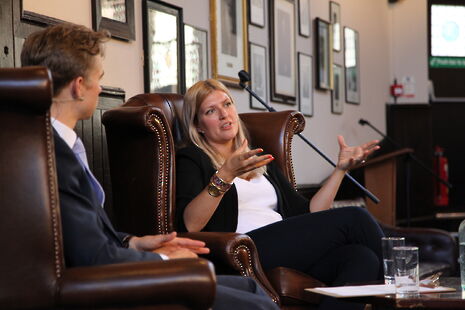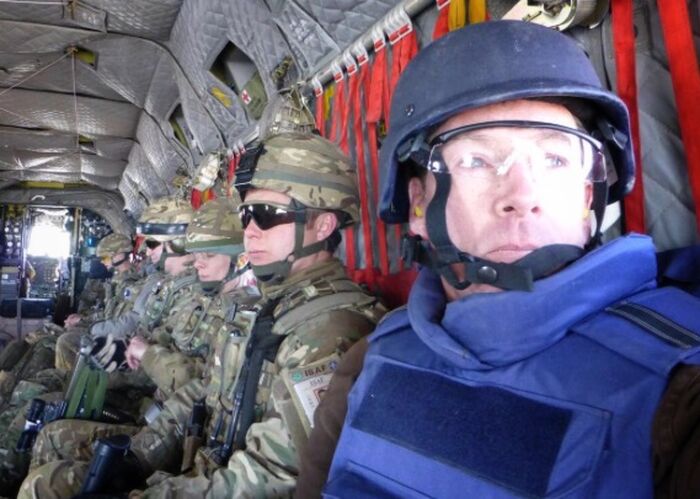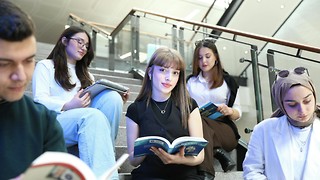Beatrice Fihn on why nuclear weapons are a ‘completely solvable problem’
The director of the International Campaign to Abolish Nuclear Weapons speaks about the practical and achievable nature of her work

“Could you please tell me, in your own words, who you are and what you do?”
“My name is Beatrice Fihn, I am the director of the International Campaign to Abolish Nuclear Weapons. Last year, the campaign won the Nobel peace prize for our work to raise awareness of the humanitarian consequences of nuclear weapons and to push governments to negotiate and comply with the treaty on the prohibition of nuclear weapons.”
She smiles and takes a sip of her water. I laugh to myself; I suppose we are about to talk about nuclear warfare in the library of the Cambridge Union as if we were talking about the weather. Go figure. For Fihn, however, this is standard procedure.
For so long, we have attributed power and prestige to nuclear weapons – you are one of the ‘important countries’ if you have them. That is really unhelpful for disarmament and non-proliferation
This grounded and unfazed attitude is the embodiment of Fihn’s approach to her work: nuclear weapons, she calmly states, are “a completely solvable problem.” In fact, Fihn calmly tells me that the International Campaign to Abolish Nuclear Weapons (ICAN), a coalition of over 500 non-government organisations, believes its treaty to prohibit nuclear weapons will be passed as international law by the end of 2019. Since opening for signature in September 2017 after being negotiated by some 120 governments, it has already been ratified by ten countries, and requires only 40 more to do so. Most importantly, this can be done without the support of any of the world’s nine nuclear-armed states. It is here I see why Fihn is so confident in the campaign’s success: “Of course you need a lot of people, but you also don’t need to wait for everyone.”
This is because ICAN, despite its focus upon policy, fights for a change in the mindset regarding nuclear warfare. “For so long, we have attributed power and prestige to nuclear weapons – you are one of the ‘important countries’ if you have them. That is really unhelpful for disarmament and non-proliferation, because other countries like North Korea think ‘I want that. I want to be important.’” Having recently returned from the Singapore summit between Donald Trump and Kim Jong Un, where the leaders discussed nuclear disarmament, Fihn describes it as more of a ‘welcome to the club’ party for North Korea.
Therefore, although she recognises that once the treaty is fully ratified only those countries that have signed it will have to comply – which will likely mean the most powerful nuclear-armed states will not have to disarm – she is confident in the treaty’s “stigmatising, normalising impact.” Fihn’s goal is to foster the same stigma in relation to nuclear weapons that exists around biological and chemical weapons. “No one brags about having chemical weapons, or is proud of that, or feels like they absolutely have to have them to defend themselves – that would be something Assad would do, not Theresa May.”
It is here that Fihn’s focus upon nuclear warfare as a humanitarian issue is central to its success. “When you look at the people nuclear weapons impact, it is impossible not to care.” This was not always Fihn’s view: interested in humanitarian work, Fihn began her career working on nuclear weapons, with the intention of “swapping to something more relevant later.” However, she recalls how she quickly realised that nuclear warfare is first and foremost “an issue of human beings”, and much of ICAN’s work is now centred around the victims of nuclear warfare and testing, such as those of Hiroshima and Nagasaki. Its work on nuclear test sites, for instance, has highlighted the racist, colonialist history of nuclear warfare: “The UK tested nuclear weapons in Australia on aboriginal land, disregarding that there were whole cultures and people living there” as they felt that “these are not people that we count as people.”
It’s not even that many countries that have nuclear weapons; the majority of countries in the world don’t have them. And, contrary to what many people like to say, they are not a fundamental part of our security system
By “reframing the conversation” around nuclear weapons in this way, Fihn argues that bipartisan support is more achievable. I wonder, however, how the necessary support will arise if the most powerful countries are the ones that are nuclear-armed and, consequently, unexposed to the long-lasting effects of nuclear warfare. “Well, I think that this is very much in line with other power struggles”, she begins. She refers to women winning the vote and the civil rights movement: “It wasn’t the men that were just like ‘yes, let’s let women vote’, nor was it the white people that were like ‘yeah, we really need to treat black people better.’ It was those groups of people who rose up and said that they were not accepting their situation anymore – and that’s what we’re trying to do with the treaty.”
This image of power rooted in “the ability to threaten”, Fihn notes, has long maintained its prestige due to its traditionally “masculine” associations. “Society has valued the ‘masculine’ traits much more as somehow tougher, stronger, more powerful”, to the point where Fihn’s humanitarian approach to tackling nuclear warfare, perceived by many as more ‘feminine’, is often undermined in a professional capacity: “People think ‘you women, always asking ‘what about the victims?’ when [they believe] it should be the ‘rational male conversation’ about military strategies. I notice very often that I can have my male colleagues make the same arguments and they just get taken more seriously.”
Hearing her nonchalantly describe the sexist bias she faces, along with the objectively monumental issue she works to tackle, I am stricken by how simple Fihn makes her work seem. I ask how being the director of such a monumental campaign feels. Unsurprisingly, she laughs breezily in response. “It’s a bit overwhelming sometimes. I mean, of course I have moments where I just think ‘this is too hard’ – why am I not, you know, trying to save kittens instead?”
However, she is completely clear on the reality of the matter, which is that nuclear weapons are simply “a made-up thing that some people built. And it’s not even that many countries that have them; the majority of countries in the world don’t have them. And, contrary to what many people like to say, they are not a fundamental part of our security system.” In an age where Russia “can rattle the United States with a couple of Facebook accounts”, she argues that nuclear weapons, like guns in the United States, are simply an out-dated safety blanket. “Facts and reason and logic all say that if you have guns in your home, you’re more likely to get shot – and yet people feel safe.” The same can be said for nuclear weapons.
Fihn tells me that ICAN’s work has only just begun, and the world’s nuclear-armed states know it. There is no doubt in her mind that the treaty will shortly be consolidated, but rejects the notion that any one individual can achieve this goal alone. Over the course of our conversation, Fihn illustrates how the fight to abolish nuclear weapons has little to do with the world’s nine armed states. It is the “ultimate question of oppression and inequality”, and in this sense, it is about making the silent majority heard, because even the most powerful “recognise the power of the majority in this world.”
 News / Local business in trademark battle with Uni over use of ‘Cambridge’17 January 2026
News / Local business in trademark battle with Uni over use of ‘Cambridge’17 January 2026 Comment / The (Dys)functions of student politics at Cambridge19 January 2026
Comment / The (Dys)functions of student politics at Cambridge19 January 2026 News / Cambridge bus strikes continue into new year16 January 2026
News / Cambridge bus strikes continue into new year16 January 2026 Features / Exploring Cambridge’s past, present, and future18 January 2026
Features / Exploring Cambridge’s past, present, and future18 January 2026 News / Your Party protesters rally against US action in Venezuela19 January 2026
News / Your Party protesters rally against US action in Venezuela19 January 2026









